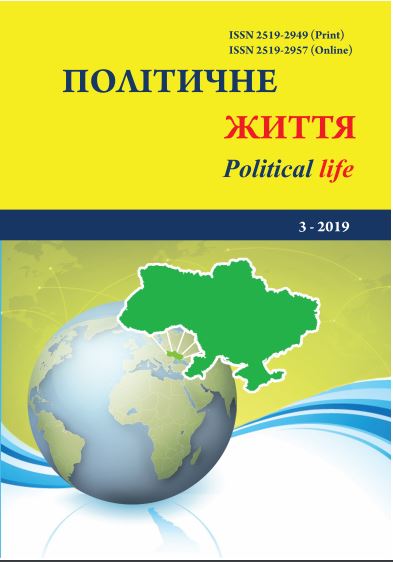Regional processes of democratization in the African continent in terms of transitology and the theory of "democratic waves".
DOI:
https://doi.org/10.31558/2519-2949.2019.3.19Keywords:
Africa, democratization, transitology, theory of "democratic waves", political transformationsAbstract
The study of the problem of democratization on the African continent in the current political situation is updated due to the increasing role of Africa in the international arena and the careful attention of researchers to the real results of democratic transit in individual countries in the post-colonial period. The author’s motivation to develop a specific topic is due to the revealed differences in the definition of models and concepts of democratic transition, including in the interpretation of its stages, varieties, role of the state, etc., and ambiguous expert assessments of the scientists of the potential of the "third wave" of democratization in African countries.
The purpose of the study is to analyze the specifics of the course of regional processes of democratization in the African continent and their consequences in terms of transitology and the theory of "democratic waves".
As a result of elaboration of the topic, the genesis of the basic concepts of the study – transitology and the theory of "democratic waves" is revealed.
On the basis of the analysis of scientific sources, it was revealed that the theoretical constructs as scientific assumptions of scientists with the practical results of democratic transit of the countries of different regions and parts of the world were not matched. On the basis of the worldview (cultural, ethno-national, religious, mental) and socio-economic aspects of the development of the peoples of the continent, the content of the category "democratic transition" has been clarified regarding the peculiarities of the political transformations in individual countries of Tropical and South Africa: Nigeria, Niger, Guinea, Mali an so on.
The stages of democratization are analyzed on the example of South Africa as a model of democracy on the continent and the establishment of a unitary republic model with elements of federalism on the basis of political consensus between the African National Congress, Zulu, and Boer national parties.
The empirical part of the study projected theoretical models of democratic transit into the sociopolitical processes of the countries of Tropical and South Africa and formulated appropriate generalizations of the deterministic democracy with traditionally established regional developmental features. The impact on social transformations of external and internal factors, political parties, nationalcivic movements and individual leaders was evaluated. The specifics of regional processes aimed at eliminating autocracy and establishing new political regimes in Africa have been clarified.
The reasons for slowing down democratic change on the continent and possible ways of overcoming them are identified. Conclusions have been formulated on the gradual and unpredictable democratic transit of establishing a new political order.
References
Баранов Н. Трансформации современной демократии: Учебное пособие. СПб.: Балтийский государственный технический университет, 2006. 215 с.
Бєльська Т. В. Демократичний транзит: специфічна риса сучасного суспільно-політичного процесу. URL: http:// www.nbuv.gov.ua/portal/Soc.../09.pdf (дата звернення: 12.02.2019 р.).
Визначення і вимірювання демократії / За ред. Д. Бітема. Львів: Літопис, 2005. 318 с.
Головченко В. І., Кравчук О. А. Країнознавство: Азія, Африка, Латинська Америка, Австралія і Океанія. Навчальний посібник. Київ: ЗАТ «Нічлава», 2006. С. 216 – 232.
Линц Х. Тоталитарные и авторитарные режимы. Неприкосновенный запас. 2018. № 4. С.16 – 62.
Мельвиль А. Ю. Демократические транзиты (теоретико-методологические и прикладные аспекты). Москва: МОНФ, 1999. 108 с.
Названы худшие диктаторы мира. URL: http://www.liveinternet.ru/users/2503040/post135531057/ (дата звернення: 21.03.2019 р.)
Наумкіна С. «Третя хвиля» демократизації: підсумки і перспективи. Український центр політичного менеджменту. URL: http://www.politik.org.ua/vid/magcontent.php3?m=1&n=24&c=303 (датазвернення:12.02.2019 р.)
Огест Г. «Весна» Чорної Африки? Український тиждень. Світ у 2012. Київ: ТОВ «СКІМП», 2011. С. 66 – 67.
Переходы к демократии в сравнительной перспективе. Демократии с Прилагательными. Политический атлас современности. Сравнительная политика. URL: http://www.slidefinder.net/c/compar_worldpol/ compar_worldpol_7/3399831 (дата звернення: 23.03.2019 р.)
Президент Ботсваны досрочно ушел в отставку. Взгляд. URL: http://www.vz.ru/news/2008/4/1/156217.html (дата звернення: 26.05.2019 р.)
Радченко О. Демократичний транзит як механізм реформування державного управління: світові моделі та проблеми застосування. Науковий вісник. 2009. Випуск № 3. C. 21 – 32.
Ростоу Д. А. Переходы к демократии: попытка динамичной модели. Полис. 1996. №5. С. 5 – 9.
Хантингтон С. Третья волна демократии. Теория и практика демократии. Избранные тексты [Пер. с англ. под ред. В. Л. Иноземцева, Б. Г. Капустина]. Москва: Ладомир, 2006. С. 79 – 84. 375 с.
Lakoff S. Democracy: History, Theorry, Practice. Boulder, 1996. 184 с.
Stepan A., Skach С. Constitutional Framework and Democratic Consolidation: Parlamentarism versus Presidentialism. World Politics. Princepton. Vol. 46. 1993. № 1. P. 18 – 19.

